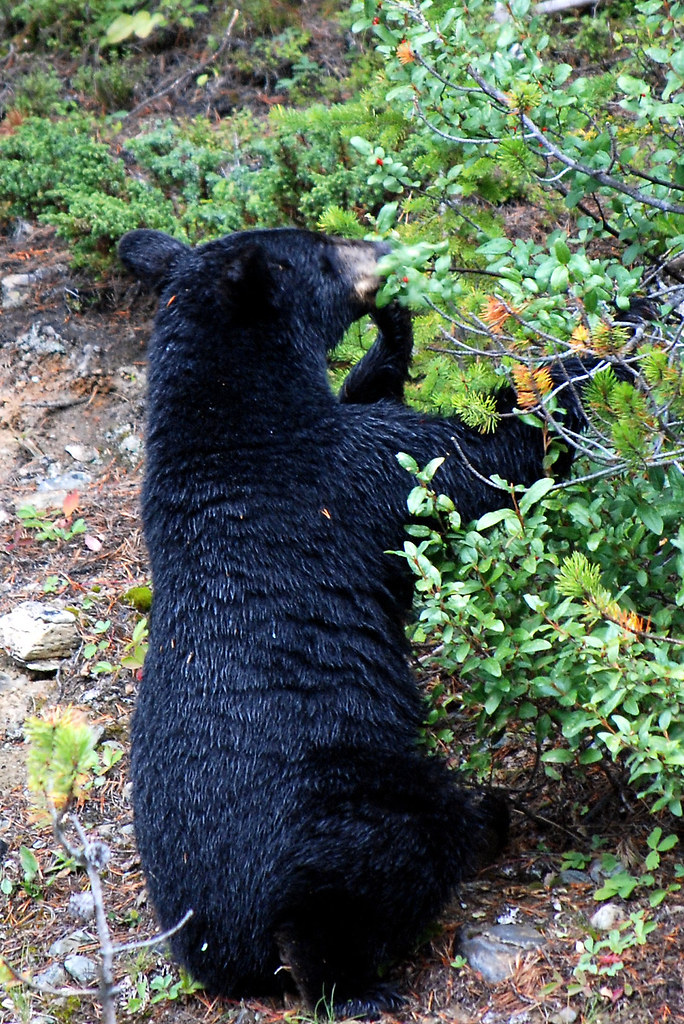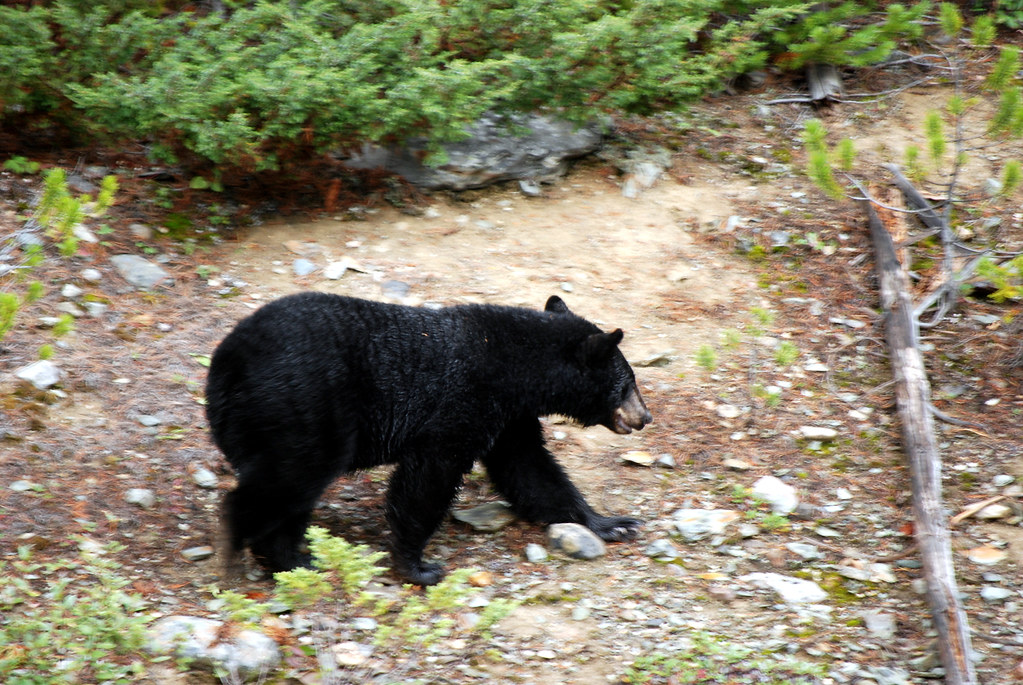.

American Black Bear (Ursus americanus), Lake Louise, Alberta: photo by Harvey Barrison, 5 September 2008
.......“the withness of the body” -- Whitehead
The heavy bear who goes with me,
A manifold honey to smear his face,
Clumsy and lumbering here and there,
The central ton of every place,
The hungry beating brutish one
In love with candy, anger, and sleep,
Crazy factotum, dishevelling all,
Climbs the building, kicks the football,
Boxes his brother in the hate-ridden city.
Breathing at my side, that heavy animal,
That heavy bear who sleeps with me,
Howls in his sleep for a world of sugar,
A sweetness intimate as the water’s clasp,
Howls in his sleep because the tight-rope
Trembles and shows the darkness beneath.
-- The strutting show-off is terrified,
Dressed in his dress-suit, bulging his pants,
Trembles to think that his quivering meat
Must finally wince to nothing at all.
That inescapable animal walks with me,
Has followed me since the black womb held,
Moves where I move, distorting my gesture,
A caricature, a swollen shadow,
A stupid clown of the spirit’s motive,
Perplexes and affronts with his own darkness,
The secret life of belly and bone,
Opaque, too near, my private, yet unknown,
Stretches to embrace the very dear
With whom I would walk without him near,
Touches her grossly, although a word
Would bare my heart and make me clear,
Stumbles, flounders, and strives to be fed
Dragging me with him in his mouthing care,
Amid the hundred million of his kind,
The scrimmage of appetite everywhere.

American Black Bear (Ursus americanus), Lake Louise, Alberta: photo by Harvey Barrison, 5 September 2008
Delmore Schwartz (1913-1966): The Heavy Bear Who Goes With Me, from In Dreams Begin Responsibilities, 1938



5 comments:
Tom,
The Great Bear, as they sometimes say, dipping his face in the honey -- how/when/where did you find this, I wonder (w/ thanks, heading out into today's version of fog. . .). . . .
10.11
grey whiteness of fog against invisible
ridge, drop falling from cypress branch
in foreground, wave sounding in channel
future horizon closed, past
which is today remote
completely silent, reflects,
in the course of time
grey white fog against invisible ridge,
wingspan of gull flapping toward point
And the poet, striding down the sidewalk, trying not to step on the cracks.
Nice to be reminded of this fine poem from a once-famous poet (famous as poets tend to be, anyway)--puts me in mind of how many wonderful poems are lurking in old anthologies and journals just waiting to be resurrected, always. What a phrase maker Schwartz could be--"the scrimmage of appetite"! "That inescapable animal"! I recently wrote an essay about one of my old teachers, Richard Eberhart, whose poems have been gradually but relentlessly dropping out of the anthologies... at his best he was very good indeed.
David Graham
That fault-line in the mind Vassilis traces, that fissure... walking it, the fear of falling-through always inclining to a plunge. A ponderous progress, riddled with regressive slippages. Comes to mind this: "for dred to fall/I stond not fast" -- Thomas Wyatt, 300 years earlier, another poet constantly aware of a permanently unstable footing. A life fraught with very real dangers in Wyatt's case, mostly phantasms in Delmore's. But the anticipation of the fall proving all too accurate in both cases. Wyatt only survived to 39. Delmore made it, somehow, to 52. Personal disposition and private circumstance seem to have burdened him with a weight of care and conscience, bending his spirit down with certain heavy premature knowledges, not least the knowledge that the importunate blight of a difficult past would always come between the poet and the pure articulation for which he strove.
Well, I should correct that to "nearly always," in light of this great poem. It remains a matter of astonishment to me that something so close to what used to be called "the tragic sense of life" should have been so beautifully contained by someone so young. (Schwartz wrote this poem at 25.)
David, there is much to be lamented, as you suggest, in the seemingly inexorable process of valuable poets dropping out of favour, dropping out of anthologies, dropping through the floor of the earth, being swallowed up, forgotten -- for this we have an industrious new phalanx of tin-eared academic "postmodern" and soi-disant "avant garde" critical eminences to (not) thank.
Or to simply construe the runes in Stephen's apt sensings --
future horizon closed, past
which is today remote
completely silent
-- but for that curious muffled sound, deep in the night, of the Great Bear, with his snout down in the dirt and the honey...
Tin-eared & theory-blind academic critics are to be lamented, yes. Where are the Randall Jarrells these days? Well, I'd suggest that good poet-critics do exist, and are doing good work, however much they tend toward invisibility or to be tucked away, as here, in blogland rather than appearing regularly in The New Yorker; but that's a much larger issue of cultural shift and lament, I suppose.
In the meantime I do love to hear people's recommendations for unduly neglected poets. Near the top of my short list is Abbie Huston Evans, who was Edna St. Vincent Millay's Sunday school teacher, and who lived well into her second century. But never was well known.
Here's one of my favorites of hers--
From An Offshore Island
(September Gale)
Hear now the ocean trouncing off this island,
The under-roar of wind down unfenced sea,
And through chance flaws, like dim light down a tunnel,
The bell buoy spent with distance.
Orion's chill, washed, subterranean glitter
Wheels up from under, and great Rigel blazes
Between tossed oak boughs that the gale of autumn
Tears at, lifts, lets fall.
Old ocean's hoarse and implicated roaring
Brings me up sitting at the dead of night,
Its pent-in mouthless fury calling back
The wild first of creation,
The rage, the might, the rampage.
---How shall I
Up from this anchored island not make answer,
I with my bones of rock-dust hardly knitted
And my blood still salt from the sea?
---Abbie Huston Evans. Fact of Crystal. Harcourt, Brace & Co., 1961.
--David Graham
Post a Comment